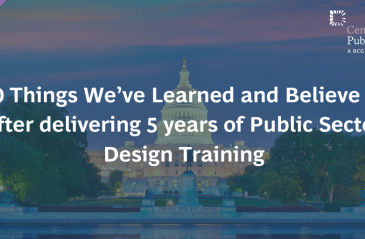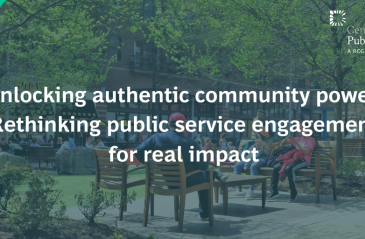
10 Things We’ve Learned and Believe in after delivering 5 years of Public Sector Design Training

@TheLab_DC tests the latest scientific insights and methods for improving policies and services
Share article@TheLab_DC has 15 social scientists based in the Office of the City Administrator in Washington
Share articleDeploying scientific methods and insights can improve govt performance, says @David_Yokum
Share articleWe put our vision for government into practice through learning partner projects that align with our values and help reimagine government so that it works for everyone.
“I want to see a world where experiments and data analytics are as ubiquitous as Microsoft Word,” says David Yokum. No one can accuse the director of Washington, DC's new government lab - The Lab @ DC- of failing to aim high.
Yokum, though, makes no apologies. On the contrary, he believes his ambitions reflect DC's reality - as an ideal place to test out the latest scientific insights and methods for improving policies and services.
“DC is unique jurisdictionally in that it is a city, county and state all wrapped up in one,” he points out. “It does everything from administering Medicaid to taking out the trash. In many governments, there is talk about evidence-based policymaking, but how do you actually do this in practice? What you see with The Lab @ DC are some structural moves to put some meat around these bones.”
Although he is too modest to say so himself, Yokum, or rather, Dr Yokum - he earned a PhD in Psychology at the University of Arizona (just one of a number of degrees) - is ideally suited for his new mission. This is not only down to his academic nous and background but also to his extensive government experience, including serving as a founding member of the White House's Social & Behavioral Sciences Team and director of its scientific delivery unit at the General Services Administration.
Now, though, he is all about helping DC Mayor Muriel Bowser's administration improve outcomes for the 600,000 people who reside within the District of Columbia's borders. “We now have a team of 15 social scientists who are part of the Office of the City Administrator,” he explains. “By being embedded in the nerve centre of city government and also spoking out with scientists at other agencies and at universities and thinktanks, it gives us a lot of scientific muscle and brainpower exactly where it is needed: on the inside.”
The idea for The Lab stems in large part from the city leaders. “It started from the vision of the leadership, including Mayor Bowser, the city administrator Rashad Young, and deputy mayor Kevin Donahue,” he says. “They all care about performance and realise that scientific methods and insights have something special to offer in how we govern ourselves.”
The formal launch of the Lab took place this summer, but the initial planning and conversations started a couple of years ago. This time-lag is not an indication of the slow pace of government but rather a deliberate ploy to take the necessary time to have the right structures and approach in place.
“In that interval, we did a lot of the groundwork in figuring out how this could work organically in the context of the DC government,” he explains. “What you get from this process is more stability when you go live, and a greater ability to absorb the interest that gets generated. Sometimes you can jump straight to a flashy press release with big ideas and then you come back three months later and nothing has happened, unfortunately.”
And how have the career DC government professionals taken to the new approach? How have Yokum and his colleagues sought to build bridges with their new colleagues? “I think in general there can sometimes be flashes of resistance when academics work with government, but it's wrong to think that people in government don't care about evidence,” observes Yokum.
“It comes down to the approach and the initial conversations. You need to build an early and common trust based on the fact you both care about the problem the agency has been working on for, in some cases, years. Remember that people in government care deeply about these issues - it's why they are in these jobs, often grinding away under a lot of stress and resource pressure. So you have to come in humbly and listen to what they have to say - that builds the trust you need.”
It may be early days but The Lab @DC is already cutting quite a wake. Its projects are listed on its website - “we want to share our interventions and processes with the world” - and Yokum speaks passionately about the initial progress.
“One of the first projects we did was with the city's Police Department, when they were deploying their body-worn camera programme,” he says. “We worked on this through a randomised controlled trial (RCT) where some officers got cameras and others didn't, basically on the flip of a coin. This means you can compare the two groups and if you see differences, you can infer it was caused by the one thing you can control that was different - namely if they were wearing a camera or not.”
He cites this example not only because it is an important social issue confronted by cities across the world but also because it illustrates how new streams of funding or a long time period aren't always necessary. “It shows what is possible when you get government itself doing these types of evaluations,” he adds.
“To do the randomisation, we had to know the logistics of how the programme was to be deployed, which was very complicated. The actual cost of adding the RCT to the deployment, though, was actually quite marginal. There are certainly some cases when lots of money is needed, but there also a large number of areas where you can do this science in a pragmatic way and you can get really rigorous learning faster and cheaper than you might otherwise think.”
The example also illustrates The Lab's wider approach to making a difference, which is based on three core functions. The first is identifying and clarifying problems that we can address with insights and solutions from the scientific field, something that Yokum says is often skipped over and is one of the hardest things to do. The second step is bringing to bear what is already known, for instance from published academic literature, or what might be gleaned from analysing administrative data, in order to design ideas addressing the problem. And the third step is about learning how these new ideas actually work in practice.
“I think it's one of the most special elements of what The Lab @ DC is trying to do,” says Yokum. “At the heart of what I want us to do is being able to answer the question of what we see when we deploy something in the world, and being able to consider what would have happened if we had done something else. As a performance community, we have made great strides in tracking things over time, but being able to add this extra element of what might have happened is going to bring the learnings to an entirely new level.”
The Lab is being funded for its first three years by the Laura and John Arnold Foundation, which supports similar units in Houston, Rhode Island and Michigan, although The Lab is the only one based inside government. Yokum, though, believes firmly that in due course The Lab will become a permanent fixture on the government scene in DC and no longer reliant on outside funding.
“I believe it is going to work and it is going to prove its own value tenfold,” he says firmly. “We are going to continue to build out into the wider government and academic community, and I'm hopeful that in five years' time, for example, some of the work we can only do here right now will be done by the agencies directly. The Lab will continue to serve as a platform for sharing tools and people, but the capacity of the agencies will continue to grow and develop.”
This vision, one where every agency has a strong data analytic capacity, is shared by many the world over, and is one that The Lab @ DC will surely help make a reality.
Beth Blauer: pushing performance across government. From her career in juvenile protection through to her new role at John Hopkins University, Beth Blauer is driving positive change in government
A doorway to delivery. Kevin Donahue has spent his career seeking to harness the power of data to improve government services. He tells Adrian Brown why good data is not an end in itself, but rather an opportunity to achieve better citizen outcomes
From Washington to The West Wing. Eli Attie tells us about life as Vice President Gore's chief speechwriter, his subsequent role on The West Wing and the secrets of effective political communication
Googling better government. After helping rescue healthcare.gov, Mikey Dickerson is now focusing on the US federal government's wider deployment of digital technology. He takes time out to tell Danny Werfel why it's no more business as usual
Winds of change. Few understand the mechanics of US elections better than Matthew Dowd. A veteran of both sides of the campaign trail, he tells us about his experiences and why change is coming to America…
Beltway and beyond. A former senior advisor to two US presidents, Elliott Abrams' view on public impact has been shaped by decades of public service. He shares his perspective on how governments can achieve more
DC despatch. Kate Josephs reflects on her experiences driving performance improvement in the British and US governments
Data do delivery. Former Maryland governor and Baltimore mayor, Martin O'Malley, tells us about a new approach to governance and delivery
By the people, for the people. Colorado's voters certainly like John Hickenlooper. Recently re-elected as governor and enjoying strong approval ratings, the former mayor of Denver tells us about his approach to policymaking and why he believes collaboration is key to success












